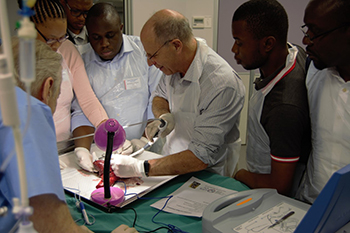Latest News Archive
Please select Category, Year, and then Month to display items
02 January 2018
Photo Destudio Architects and Urban planners
 Architectural illustration of the planned Science Park on the university’s Bloemfontein Campus.
Architectural illustration of the planned Science Park on the university’s Bloemfontein Campus.
Situated next to the Winkie Direko Building on the University of the Free State’s Bloemfontein Campus, an exciting development in the form of a Science Park is on the horizon for the Faculty of Education.
This future development will comprise an outdoor Science Garden and an indoor Science Discovery Centre. It will be characterised by interactive educational displays and exhibitions and will feature an ICT Laboratory, amphitheatre, Family Math and Family Science training facilities, as well as a “planetarium dome simulator”.
The Science Park is in line with the university’s commitment to advance teaching and learning with regard to mathematics and science.
“Since the Science-for-the-Future (S4F) unit from the Faculty of Education focuses on the development of innovative teaching and learning programmes, the envisaged Science Park will support and complement current and future engaged learning initiatives. The Science Park will be a customised teaching and learning environment that embraces and promotes the most effective ways of teaching science, mathematics and technology, through hands-on, interactive, experiential and student-driven educational methods. This will provide opportunities for student teachers from the Faculty of Education, as well as teachers who receive in-service training at the UFS, to enhance the scope of their maths and science pedagogical content knowledge,” said Dr Cobus van Breda, Programme Director of the Science-for-the-Future (S4F) unit in the Faculty of Education.
The Science Park will also serve as a social space on campus where all students can interact within a fun and exciting popular science environment. “We see this as a creative approach to the use of spaces on campus to create an aesthetic and educational added value,” said Prof Loyiso Jita, Dean of the Faculty of Education.
In future, the Science Park, along with the existing synergy between the science and mathematics training programmes based at the Faculty of Education, the Naval Hill Planetarium and the Boyden Observatory, will provide a rich and unique opportunity to experience real-life science as well as content in context; all contributing factors to effective teaching and learning.
The Science Park project is estimated to be completed by the end 2019.
Great turnout for Hannes Meyer Symposium in Cardiothoracic Surgery
2017-05-05

Symposium attendees watch attentively as
Dr Johan Brink demonstrated a MAZE procedure
with a pig’s heart.
Photo: Supplied
The University of the Free State’s Faculty of Health Sciences hosted the annual Hannes Meyer Symposium in Cardiothoracic Surgery. The symposium was organised by Prof Francis Smit, head of the department of Cardiothoracic Surgery at the UFS, with the support from the Society of Cardiothoracic Surgeons of South Africa and the European Association of Cardiothoracic Surgery (EACTS). Over the past 16 years this symposium has steadily been growing in stature and prestige leading to the resounding success that was this year’s event.
Medical advancements explored
The aim of the symposium is to provide an overview of the latest advances in Cardiothoracic Surgery and perfusion as well as providing hands-on training via simulation to trainees from South Africa and the rest of the African continent. Didactic lectures and papers by registrars were an integral component of the symposium. The South African community was represented by various heads of departments, trainees, senior specialists and perfusionists from all the training centres in the country. There were also delegates representing Uganda, Mozambique, Nigeria and Zambia.
Heart surgery off to new heights
Simulation in Cardiothoracic Surgery and Perfusion can be compared to airline pilots with high risk, with complex surgeries being first done in simulators before being attempted in the real world. The UFS is proud to have a state-of-the-art simulation facility, which was used to facilitate the programme.
The range of simulation was extensive and included simple procedural models to complex full theatre setups with Human Performance Models in perfusion that simulated crisis scenarios with the aid of computerised devices that react in real time to human intervention.
Industry support highly appreciated
This event was coordinated by Dr Jehron Pillay, senior registrar in the Department of Cardiothoracic Surgery and Marilee Janse van Vuuren, deputy-director clinical technology, in the department. This was the first time that such extensive simulation models were used in the programme and judging from the positive response received, it has certainly set the benchmark for all future events.
The event has received invaluable support over the years from EACTS that has selected Bloemfontein as the site of its African training programme as a result of the high level of training and education achieved here.
The academic discussions were chaired by Profs Marko Turina and Jose Pomar (past presidents of EACTS) and Pieter Kappetein (past secretary general of EACTS) who are extremely well known internationally for their contribution to advancing Cardiothoracic training and education.
Our guests from EACTS presented didactical lectures on research methodology, international randomised trials and discussed recent developments and controversies in cardiothoracic surgery.
Registrars from all South African units presented a thoracic and cardiac surgery paper from each unit highlighting specific disease conditions, moderated by heads of departments and the international panel.
An event of this magnitude requires significant financial support and the medical industry in South Africa stepped up to the plate in providing financial and logistical support in order to make it possible.